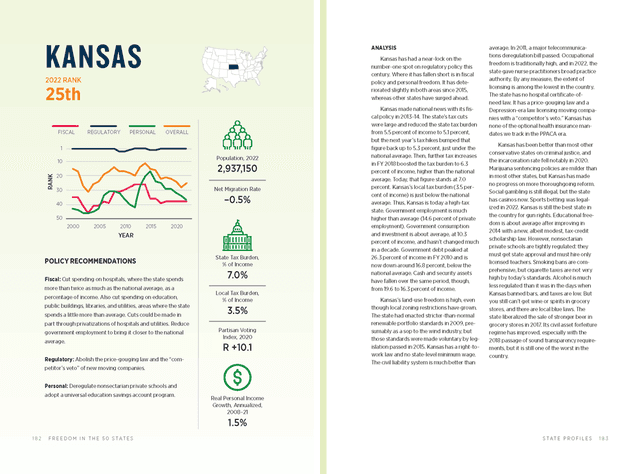Policy Recommendations
- Fiscal Cut spending on hospitals, where the state spends more than twice as much as the national average, as a percentage of income. Also cut spending on education, public buildings, libraries, and utilities, areas where the state spends a little more than average. Cuts could be made in part through privatizations of hospitals and utilities. Reduce government employment to bring it closer to the national average.
- Regulatory Abolish the price-gouging law and the “competitor’s veto” of new moving companies.
- Personal Deregulate nonsectarian private schools and adopt a universal education savings account program.
Analysis
Kansas has had a near-lock on the number-one spot on regulatory policy this century. Where it has fallen short is in fiscal policy and personal freedom. It has deteriorated slightly in both areas since 2015, whereas other states have surged ahead.
Kansas made national news with its fiscal policy in 2013–14. The state’s tax cuts were large and reduced the state tax burden from 5.5 percent of income to 5.1 percent, but the next year’s tax hikes bumped that figure back up to 5.3 percent, just under the national average. Then, further tax increases in FY 2018 boosted the tax burden to 6.3 percent of income, higher than the national average. Today, that figure stands at 7.0 percent. Kansas’s local tax burden (3.5 percent of income) is just below the national average. Thus, Kansas is today a high-tax state. Government employment is much higher than average (14.6 percent of private employment). Government consumption and investment is about average, at 10.3 percent of income, and hasn’t changed much in a decade. Government debt peaked at 26.3 percent of income in FY 2010 and is now down around 16.8 percent, below the national average. Cash and security assets have fallen over the same period, though, from 19.6 to 16.3 percent of income.
Kansas’s land-use freedom is high, even though local zoning restrictions have grown. The state had enacted stricter-than-normal renewable portfolio standards in 2009, presumably as a sop to the wind industry, but those standards were made voluntary by legislation passed in 2015. Kansas has a right-to-work law and no state-level minimum wage. The civil liability system is much better than average. In 2011, a major telecommunications deregulation bill passed. Occupational freedom is traditionally high, and in 2022, the state gave nurse practitioners broad practice authority. By any measure, the extent of licensing is among the lowest in the country. The state has no hospital certificate-of-need law. It has a price-gouging law and a Depression-era law licensing moving companies with a “competitor’s veto.” Kansas has none of the optional health insurance mandates we track in the PPACA era.
Kansas has been better than most other conservative states on criminal justice, and the incarceration rate fell notably in 2020. Marijuana sentencing policies are milder than in most other states, but Kansas has made no progress on more thoroughgoing reform. Social gambling is still illegal, but the state has casinos now. Sports betting was legalized in 2022. Kansas is still the best state in the country for gun rights. Educational freedom is about average after improving in2014 with a new, albeit modest, tax-credit scholarship law. However, nonsectarian private schools are tightly regulated: they must get state approval and must hire only licensed teachers. Smoking bans are comprehensive, but cigarette taxes are not very high by today’s standards. Alcohol is much less regulated than it was in the days when Kansas banned bars, and taxes are low. But you still can’t get wine or spirits in grocery stores, and there are local blue laws. The state liberalized the sale of stronger beer in grocery stores in 2017. Its civil asset forfeiture regime has improved, especially with the 2018 passage of sound transparency requirements, but it is still one of the worst in the country.

